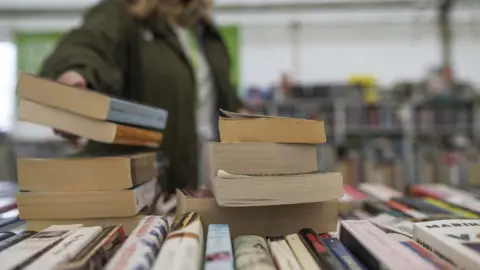Second hand doesn't mean second best
Kristin Murdock
30 June 2024, 3:40 AM
 Buying second hand goods has plenty of advantages - for your hip pocket, and also for the environment.
Buying second hand goods has plenty of advantages - for your hip pocket, and also for the environment.What goes around, comes around, and that's particularly true when it comes to second hand shopping.
New estimates say that in NSW alone, $432 million was saved through heading to 'op shops' or similar second hand outlets - a substantial saving in our current cost of living crisis.
In their joint report 'Measuring Reuse Activity and Impacts in NSW’, not-for-profit organisation Charitable Reuse Australia and the NSW Environment Protection Authority (EPA) looked at the environmental, economic and social benefits of the movement to purchase second hand goods.
Mignon Gardner has volunteered at the Warren 'Vinnies' second hand shop for two years.
She was not surprised to hear of the popularity of shopping second hand and said they are always extremely busy with customers eager to grab a bargain.
"Clothing would definitely be our most popular item, followed by manchester and hardware," Ms Gardner said. "What's unique about us here at Warren, is that everything in our shop is donated within the Warren district and we don't bring any items in from outside, so that’s a huge saving for us.
"And if you see you favourite shirt walking around the streets on someone else, it doesn’t really matter does it?
"It’s a bit of a social place as well, and everyone catches up. The money we raise goes toward helping the homeless and other causes and is distributed through our main office in Parkes."
Beside the chance of nabbing some clothing at a fraction of retail price, reuse is also accelerating the state’s transition to a circular economy, saving 321,000 tonnes of CO2, equivalent to removing 134,000 passenger vehicles from the road.
Charitable Reuse Australia CEO Omer Soker said this initiative is circular economy leadership in action, and NSW is leading the way.
“Whenever Australians donate a quality item or buy something pre-loved from a charity shop, they make a massive impact socially and environmentally. Additionally, they find something unique to cherish,” Mr Soker said.
“It’s inspiring to see how many second-hand items are being rehomed, keeping them out of landfill and putting them back into the hands of those who need them. Buying second-hand is good for the environment, good for society and good for you. There’s something intrinsically wonderful about being conscious, sustainable, and ethical all at the same time.”
Other key findings estimate reuse organisations in NSW have:
- Rehomed 107.7 million second-hand items.
- Repaired 3,900 tonnes of items for re-use.
- Sold or donated second-hand goods valued at $243 million.
- Reinvested $51 million raised into social and community programs.
- Avoided the direct consumption of 29,900 tonnes of virgin materials.
- Saved 80,000 hectares of land, equivalent to the size of 75,000 soccer pitches.

Second hand books can be hard to move. IMAGE BBC
While this is great news, Ms Gardner said books were not so easy to sell and were generally the hardest thing for them to move.
"Since computers, no-one wants books anymore. We get so many and can really on only keep the ones that are in the best condition. Any keen readers should come and take a look at what we have," she said.
And there's no need to feel guilty about taking jobs away from people in industry's such as clothing manufacture while shopping second hand.
NSW EPA CEO Tony Chappel said reuse generates 25 times more jobs than recycling and 81 times more than landfill on a per tonne basis.
"This evidence in creating employment and providing valuable training is truly commendable, making a real difference in people’s lives,” Mr Chappel said.
"Supporting the reuse sector means supporting local charities and community groups, who reinvest millions back into our economy. It's a powerful reminder that every item donated or purchased second-hand has a ripple effect of positive outcomes."



